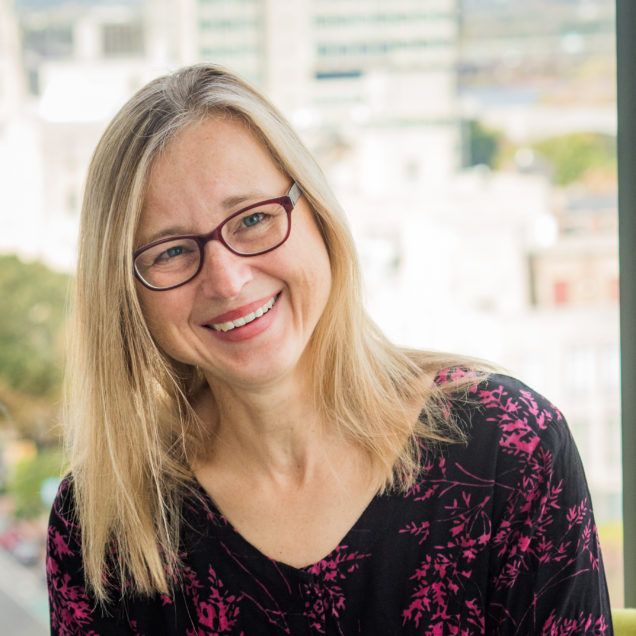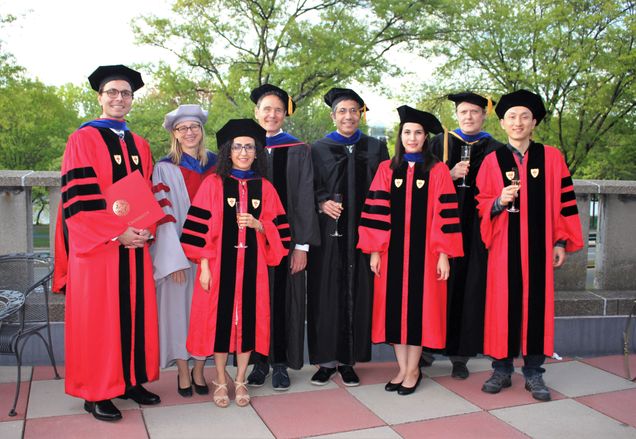 The College of Arts & Sciences remembers Margrit Betke, a professor of computer science and computing & data Sciences, affiliated faculty member in the College of Engineering electrical & computer engineering, and core faculty member in the Rafik B. Hariri Institute for Computing and Computational Science & Engineering. Betke, a pioneering computer scientist, award-winning researcher, beloved mentor, and advocate for using technology to improve lives, died on August 13 after a long battle with cancer.
The College of Arts & Sciences remembers Margrit Betke, a professor of computer science and computing & data Sciences, affiliated faculty member in the College of Engineering electrical & computer engineering, and core faculty member in the Rafik B. Hariri Institute for Computing and Computational Science & Engineering. Betke, a pioneering computer scientist, award-winning researcher, beloved mentor, and advocate for using technology to improve lives, died on August 13 after a long battle with cancer.
“Professor Betke exemplified the very best of our academic community—a brilliant scholar, a devoted mentor, and a compassionate colleague whose work has left a profound impact on both science and society,” says Gloria S. Waters, Boston University provost and chief academic officer. “Her legacy will continue to inspire students and researchers at Boston University and beyond.”
“Margrit was truly an inspiration—positive, eager to help, and astute in her ability to advocate for positive change,” says Stan Sclaroff, dean of Arts & Sciences, who cofounded and co-led the Computer Science Image and Video Computing Research Group with Betke. “She leaves a legacy that will shape the future of artificial intelligence and the lives of those she inspired. She will be remembered for her kindness, vision, and the communities she built at BU and beyond.”
Betke applied cutting-edge computer vision techniques to a wide range of fields—from cybersecurity to neuroscience, social media to physical therapy, and healthcare to the environment. She developed human-camera-computer interfaces for people with severe disabilities, medical imaging algorithms for early cancer detection, machine learning models to predict stroke recovery, datasets to help neuroscientists study animal behavior, video-based ecological censusing for conservation, AI systems to automatically evaluate physical therapy rehabilitation exercises, interactive educational software, and more.
She co-invented the “Camera Mouse,” an assistive technology that has transformed the lives of people with severe motion impairments, and helped pioneer algorithms for medical imaging that anticipated today’s AI-based approaches to early cancer detection. Her video-based ecological censusing techniques advanced conservation science and her related work in video-based animal tracking enabled bio-inspired control of autonomous systems. Her work in AI and education opened new possibilities for understanding and supporting student learning. She also explored the role of AI in analyzing news and social media, addressing important issues of bias, equity, and ethics.
“Her work exemplified what convergence in research is all about—a full decade before that term was coined,” notes Azer Bestavros, associate provost for computing and data sciences and William Fairfield Warren Distinguished Professor of Computer Science. “She always sought ways to use AI for the betterment of society and to improve the lives of people, and her ideas and work anticipated the AI for Good movement.”
“She was an early advocate for interdisciplinary collaboration, and her work in this area led to significant advancements across diverse fields, including human-computer interaction, medical imaging, and conservation ecology,” says George Kollios, a CAS professor and chair of computer science. “She deeply cared for her students and colleagues—especially junior faculty—always taking the time to support them through their academic and personal challenges.”

Betke was the driving force in the development of the Computer Science MS in AI program, which she later directed, and a proponent of the PhD program in Computing & Data Sciences. She was a co-director of the Computer Science Department’s Image and Video Computing Research Group and a co-directer of the Artificial Intelligence Research (AIR) Initiative at the Rafik B. Hariri Institute for Computing and Computational Science & Engineering. She was also a major contributor and leader in the BU Women in Science and Engineering efforts. She was also a prolific researcher, authoring more than 200 research papers, securing major research grants, and serving in leadership roles for top journals and conferences.
“Margrit was always there and eager to contribute in multiple ways, advising the Hariri Institute on many issues and serving as a trusted and thoughtful voice in making decisions for many of our programs,” says Yannis Paschalidis, director of the Hariri Institute and a BU College of Engineering Distinguished Professor of Engineering. “I personally have had the pleasure of collaborating with Margit over many years, and I very much valued and appreciated her research contributions and her overall demeanor. She will be deeply missed, but her legacy and many achievements will continue to inspire us.”’
And throughout her research, she remained dedicated to her students. She guided 20 PhD students, as well as numerous graduate and undergraduate researchers, and continued to read proposals and mentor students even in her final days. A few weeks before she was admitted to the hospital, she submitted a patent and a paper with former student, and in July she won a Best Paper Award with student collaborators for a paper presented at the Annual Meeting of the Association for Computational Linguistics, “Insights into Climate Change Narratives: Emotional Alignment and Engagement Analysis on TikTok.”
“She was the one who opened the door of AI to me,” recalls Yiwen Gu (GRS’19,’25) one of Betke’s two current PhD students. “Margrit fostered an environment of intellectual freedom, allowing me to explore diverse research paths, yet always pointing me toward a viable direction whenever I faltered. I could not have reached this significant milestone without her.”
“She was a very kind and nurturing advisor, supportive of anything we wanted to do or learn,” says Mahir Patel (GRS`22), Betke’s other student. “Even though our musical tastes differed, we connected over our shared love for music. I will always treasure the guitar she gave me to restore and use. Her thoughtful gifts and unwavering support will remain with me forever.”

Beyond her scholarship, Betke is remembered as a generous colleague and a strong advocate for women in science and engineering. She enjoyed dancing, gardening, figure skating, photography, reading, sailing, skiing, singing, sports, traveling, reading, and windsurfing. She sang in the MIT choir during graduate school, as well as in her church choir for many years. She took dancing classes at Boston University, learned Chinese on DuoLingo, and maintained a list of books in English and German that she recommended on her website. She adopted a formerly wild dog, Shilah, whom she met on a hiking trip in the Grand Canyon, and passed along a treasured guitar to a PhD student to restore and use.
A few days before Margrit Betke died in August, her hospital room was crowded with colleagues and students who flew in from across the country. Neighbors brought flowers from her garden, and her former PhD students held her hand. It was a powerful reflection of the community she built through her kindness, generosity, and unwavering support of others,” Sarah Bargal (GRS’19), an assistant professor of computer science at Georgetown.

“So many people loved her,” says Diane Hirsh Theriault (CAS’04, GRS’15), a software engineer at Google. “There are many people that are where they are, or who they are, today because of the way she touched their lives and set them on the path that they ended up walking… I certainly count myself among the people who experienced Margrit as a motherly, nurturing, loving mentor who cared deeply about her students.”
“She was hardly speaking, but she told me she loved me and her other students like the children she never had,” recalls Mehrnoosh Sameki (GRS’17), a product lead at Microsoft and an adjunct assistant professor of computer science at BU. “I told her how much I owe who I am today to her…and she told me, now, it’s my turn to take other young women under my wings.”
A memorial service will be held on Saturday, September 20, at 10:30 am, at University Lutheran Church, 66 Winthrop Street, Cambridge, Mass. The services will also be on Zoom for those unable to attend in person. Additional information is available on the church website, www.unilu.org.